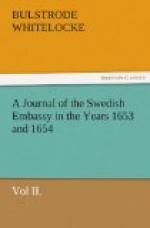March 30, 1654.
[SN: An interview with the Queen.]
One of the Queen’s lacqueys came to Whitelocke’s house in dinner-time, to desire him, from the Queen, to come to her at two o’clock. Whitelocke was a little sensible of the quality of the messenger, and therefore himself would not speak with him, but sent his answer by one of his servants, and accordingly waited on the Queen.
He was met at the guard-chamber by Grave Tott and divers of the Queen’s servants, with more solemnity than ordinary, and presently brought to the Queen. After her excuse of his not having had audiences she fell into discourse of his business. Whitelocke presented to her a form of articles, according to his own observations upon those articles he had formerly given in, and upon those he received from Grave Eric. Thereupon the Queen said to him, “You will not consent to any one of my articles, but insist upon all your own.” Whitelocke showed her wherein he had consented to divers of her articles, and for what reasons he could not agree to the rest. They had discourse upon the whole, to the same effect as hath been before remembered.
The Queen told Whitelocke, that if those articles should not be concluded, that nevertheless the amity between the two nations might be continued. Whitelocke answered, that it would be no great testimony of amity, nor proof of respect to the Protector and Commonwealth, to send back their servant after so long attendance, without effecting anything. The Queen said she would despatch his business within a few days, and, she hoped, to his contentment. Whitelocke told her it was in her Majesty’s power to do it; that he could not stay until the change whereof people discoursed, and that he had her Majesty’s promise for his despatch, which he knew she would not break.
Then the Queen fell into other discourses, and in particular of poetry; which occasion Whitelocke took to show her a copy of Latin verses made by an English gentleman, a friend of Whitelocke’s, and sent over to him hither, and which he had now about him, and knew that such diversions were pleasing to the Queen.[71]
At his leisure hours, Whitelocke turned these verses into English, which ran thus:—
“To the most Illustrious
and most Excellent Lord, the Lord
Whitelocke, Ambassador Extraordinary
to the Most Serene Queen of
Sweden. An Ode.
Whitelocke, delight of Mars,
the ornament
Of gownmen, from thy country
being sent,
Tribunals languish; Themis
sad is led,
Sighing under her mourning
widow’s bed.
Without thee suitors in thick
crowds do run,
Sowing perpetual strife, which
once begun,
Till happy fate thee home
again shall send,
Those sharp contentions will
have no end.
But through the snowy seas
and northern ways,
When the remoter sun made
shortest days,
O’er tops of craggy




